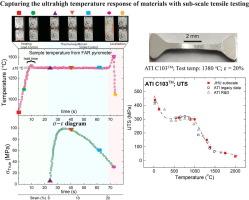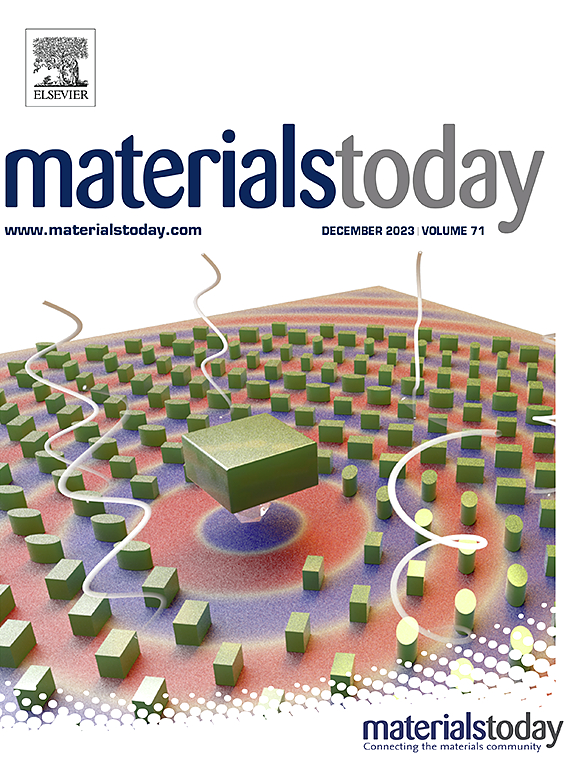Capturing the ultrahigh temperature response of materials with sub-scale tensile testing
IF 21.1
1区 材料科学
Q1 MATERIALS SCIENCE, MULTIDISCIPLINARY
引用次数: 0
Abstract
Materials that can maintain their strength at extreme temperatures are in great demand. Efforts to develop ultrahigh temperature materials are underway, but ultrahigh temperature data is hard to find, and tensile tests conducted above 1400 °C are expensive and extremely rare. Here, we demonstrate Joule heating of sub-scale specimens as a promising alternative for conducting ultrahigh temperature tensile tests. Challenges associated with testing at extreme temperatures have been addressed, and unique advantages of the new methodology include rapid heating (and cooling) of specimens to temperatures as high as their melting temperatures, in vacuum, with in situ temperature and strain measurement. Proof-of-concept tensile tests on ATI C103™ were conducted at temperatures ranging from 25 to 2,000 °C, and the results are shown to be in excellent agreement with proprietary datasets. This new test methodology has unveiled a new ultrahigh temperature plateau in the ATI C103™ alloy above 1500 °C and opens the door for exploring ultrahigh temperature deformation mechanisms in a wide variety of materials.

用亚尺度拉伸试验捕捉材料的超高温响应
能够在极端温度下保持强度的材料需求量很大。开发超高温材料的努力正在进行中,但超高温数据很难找到,而且在 1400 °C 以上进行的拉伸试验既昂贵又极为罕见。在这里,我们展示了对亚尺度试样进行焦耳加热的方法,这是进行超高温拉伸试验的一种很有前途的替代方法。在极端温度下进行测试所面临的挑战已经得到解决,新方法的独特优势包括在真空中将试样快速加热(和冷却)至熔化温度,并进行现场温度和应变测量。对 ATI C103™ 进行了概念验证拉伸测试,温度范围为 25 至 2,000 °C,测试结果与专有数据集非常吻合。这种新的测试方法揭示了 ATI C103™ 合金在 1500 °C 以上的新超高温高原,为探索各种材料的超高温变形机制打开了大门。
本文章由计算机程序翻译,如有差异,请以英文原文为准。
求助全文
约1分钟内获得全文
求助全文
来源期刊

Materials Today
工程技术-材料科学:综合
CiteScore
36.30
自引率
1.20%
发文量
237
审稿时长
23 days
期刊介绍:
Materials Today is the leading journal in the Materials Today family, focusing on the latest and most impactful work in the materials science community. With a reputation for excellence in news and reviews, the journal has now expanded its coverage to include original research and aims to be at the forefront of the field.
We welcome comprehensive articles, short communications, and review articles from established leaders in the rapidly evolving fields of materials science and related disciplines. We strive to provide authors with rigorous peer review, fast publication, and maximum exposure for their work. While we only accept the most significant manuscripts, our speedy evaluation process ensures that there are no unnecessary publication delays.
 求助内容:
求助内容: 应助结果提醒方式:
应助结果提醒方式:


